RFK Jr has a vision to change America. His family say he’s a crackpot
As Robert F Kennedy Jr took to the stage in front of Philadelphia’s Independence Hall on Monday to unveil his vision for ending hundreds of years of two-party rule, a technical hitch with the teleprompter briefly threatened to derail his big moment.
“I need my speech”, he complained as he disappeared from view, stage right. “It’s upside down.”
In the Netflix sci-fi hit Stranger Things, the “Upside Down” is the name given to a mysterious alternate dimension that exists parallel to the known world. In other words, an apt description for Kennedy’s presidential campaign.
Kennedy is often described as paranoid, delusional and dangerous. And that’s just by his own family.
But in his supporters’ eyes, a Kennedy presidency offers the chance to rewrite the rules in Washington, DC to create a more equitable system for all.
Many see Kennedy as a potential disruptor-in-chief who would finish the job that was begun by Donald Trump and is being continued by the likes of Matt Gaetz, who brought chaos to Capitol Hill last week as he killed off Kevin McCarthy’s speakership.
The Independent attended Kennedy’s final public campaign event as a Democrat in New Jersey in late September, and his first as a declared independent in Pennsylvania on 9 October.
And the enthusiasm for change and hostility towards the Democrats, in particular, and the status quo more generally, was evident.
“The blue team-red team thing has run its course,” said Stephan Ott, a 43-year-old tech consultant from Philadelphia who was among the 1,000 or so supporters who showed up to hear Kennedy’s announcement on Monday.
“We have a senior citizen’s home [in Washington] which fortunately was broken up last week by Matt Gaetz,” Mr Ott told The Independent, describing himself as a member of the “lost generation”.
“I’m hoping we capture some of the momentum today in Philadelphia.”
‘A smug elite’
Once Kennedy’s speech was recovered from the upside down, he tried his best to convince the crowd that he stood a realistic chance of defying the odds, over the course of an hour-long speech.
“It can all look pretty dark,” he said in raspy tones in front of the site where the founding fathers signed the Declaration of Independence in 1776.
“We seem to be cycling from despair to rage and back to despair again”, Kennedy said. “The country is sitting on top of a powder keg. Americans are angry at being left out, left behind, swindled, cheated and belittled by a smug elite that has rigged the system in its favour.”
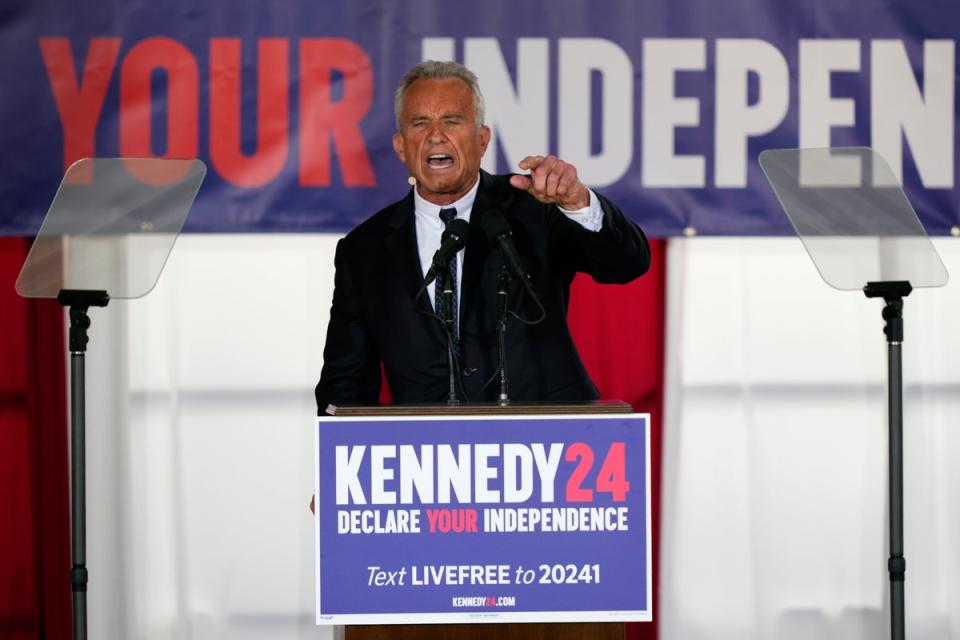
He took aim at President Joe Biden’s age, drawing the loudest boos of the day.
Then he suggested that Donald Trump’s 91 criminal charges and civil fraud and sexual assault liabilities make him a less-than-ideal candidate. The mention of “President Trump” barely raised a murmur.
“Who is the liberal now and who is the conservative? Who is the left and who is the right?” Kennedy asked.
“These labels make less and less sense, yet out of habit we still group ourselves around the empty husks of those old alignments and threadbare ideologies. But now that habit is breaking down.”
As Kennedy told it, the parties are a “two-headed monster” constantly bickering with itself, and leading the country into armageddon.
He claimed both parties are running scared of a third-party candidate with high name recognition running a no-labels-style, populist campaign.
“They recognise an authentic challenge to their power when they see one,” he said.
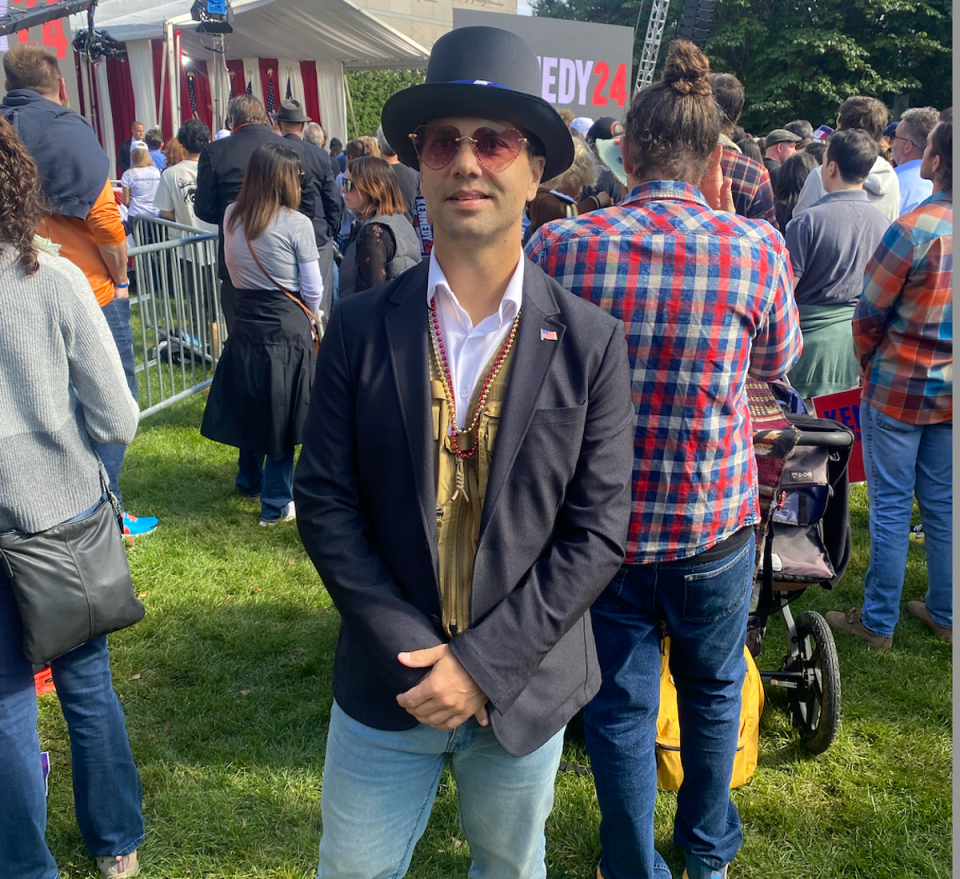
Supporter Mr Ott told The Independent that RFK Jr’s conspiratorial statements would not impair the former environmental lawyer’s ability to run the federal executive.
“Don’t be fooled by all of the tinfoil stuff that swirls around Bobby,” he said. “Bobby understands how to run a government and how to pull the levers in Washington to try to make some change.”
While Kennedy was speaking, his sister Kerry Kennedy issued a statement on behalf of four members of the illustrious political dynasty, denouncing his candidacy as “perilous to the country”.
“Bobby might share the same name as our father, but he does not share the same values, vision or judgment,” wrote Ms Kennedy.
The statement was far from the first public schism in the family. In July, John F Kennedy’s grandson Jack Schlossberg released a scathing rebuke of his cousin’s politics in an Instagram video.
“He’s trading in on Camelot, celebrity, conspiracy theories and conflict for personal gain and fame,” Schlossberg said.
“I’ve listened to him. I know him. I have no idea why anyone thinks he should be president. What I do know is, his candidacy is an embarrassment.”
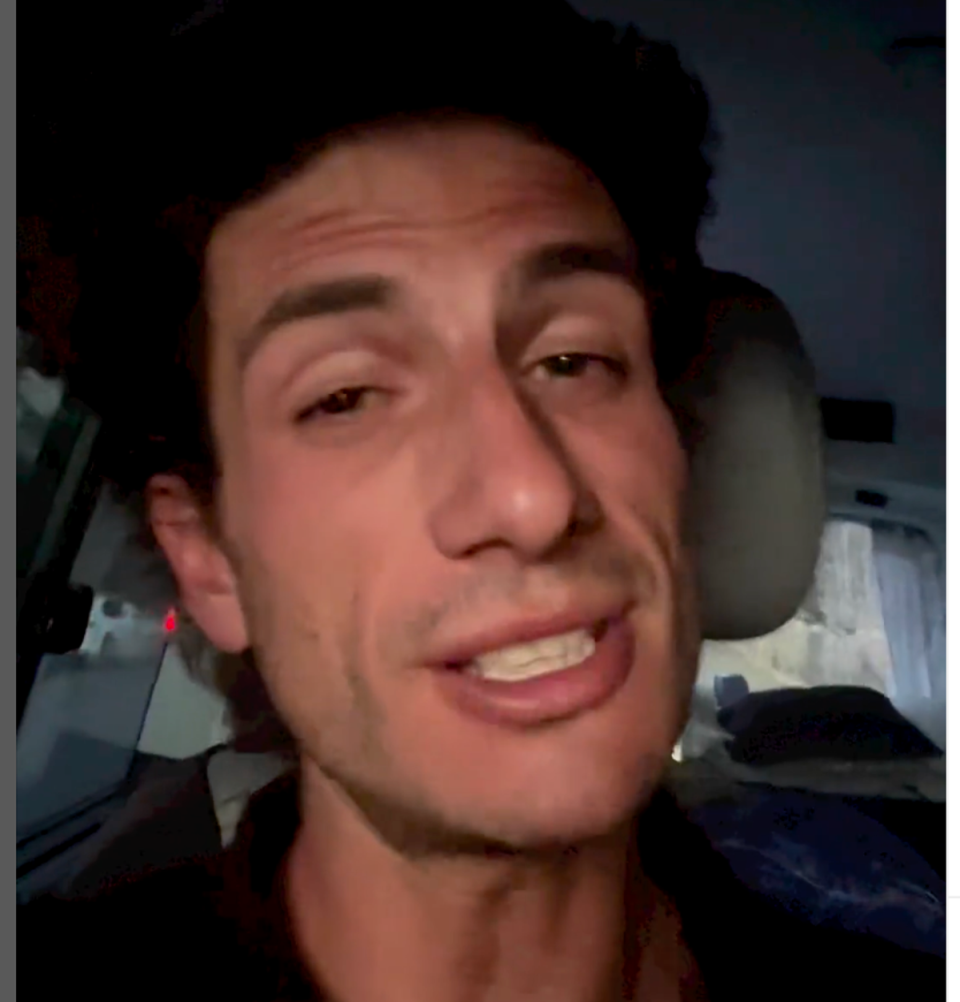
Those disavowals were a stark reminder of the divisions within the usually private family that Kennedy’s candidacy has cast out into the open.
To try to show unity, Kennedy brought a few relatives with him to Philadelphia.
He thanked his son Bobby Kennedy III, and his son’s wife Amaryllis Fox Kennedy, a former CIA agent and documentary maker who is Kennedy’s campaign co-manager. (Fox Kennedy was paid $24,000 by the Kennedy campaign in June, according to campaign filings).
Kennedy’s wife Cheryl Hines, best known for her role in Curb Your Enthusiasm, introduced her husband by saying: “Americans want to work together. They want someone to bring them together and make this country better.”
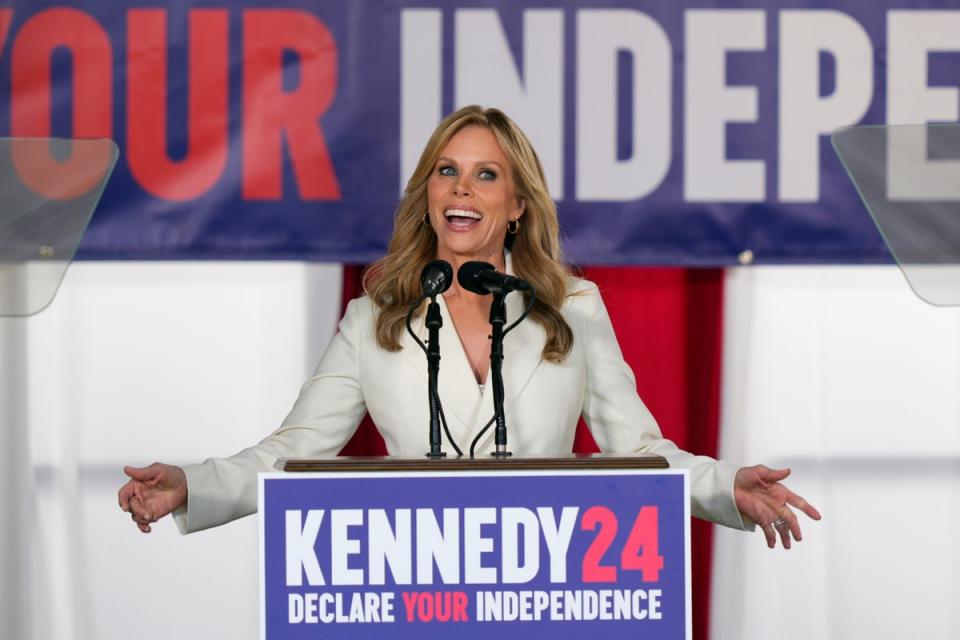
Kyle Kemper, a “crypto enthusiast” and anti-vaxxer who also happens to be Justin Trudeau’s half-brother, hyped up the crowd ahead of Kennedy’s speech with a chants of “The remedy is Kennedy’. Kemper describes himself as a steward of the Kennedy Party on social media, and has been driving the Kennedy campaign bus around the US.
Also on the undercard was Rabbi Shmuley Boteach, author and star of the Shalom in the Home reality TV series, who said it was an “American abomination” that Kennedy had not been afforded Secret Service protection, a long-running source of friction for the campaign.
Among the crowd was Vincent Fusca, who supporters of the QAnon conspiracy theory believe is Kennedy’s first cousin, John F Kennedy Jr, who died in 1999.
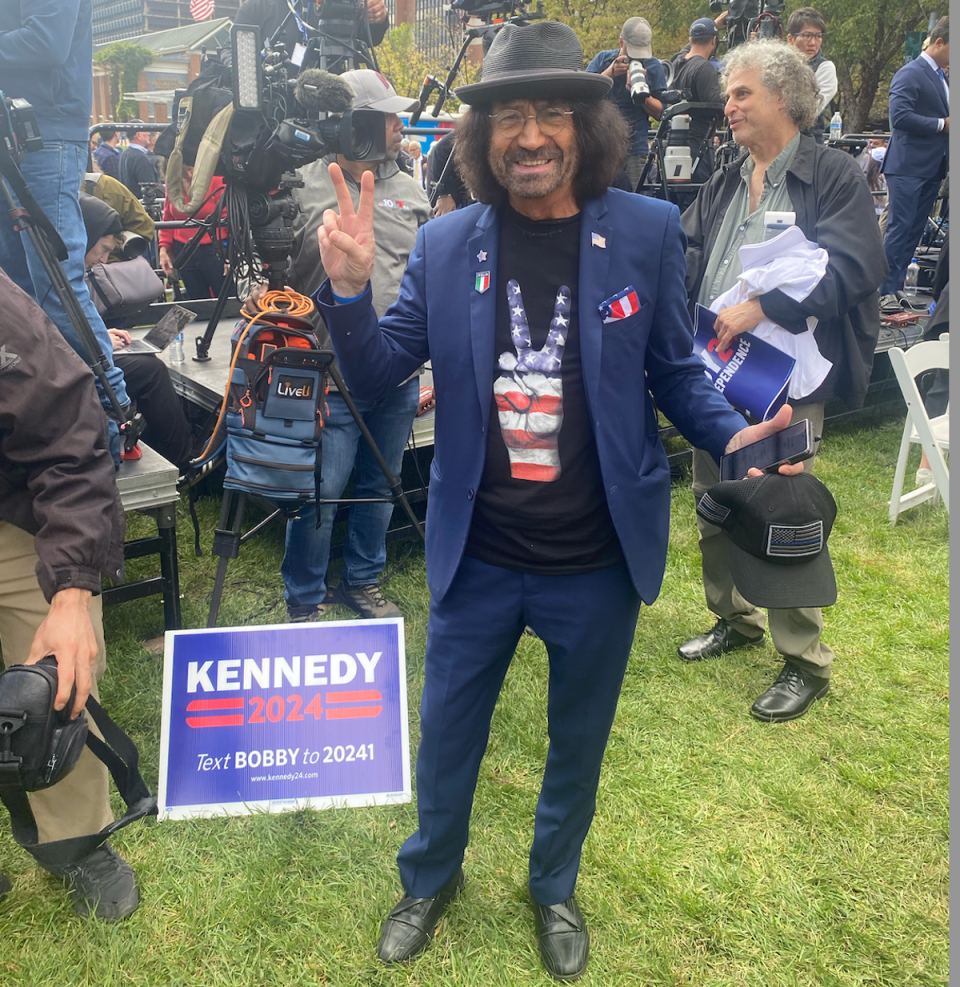
Mr Fusca enthusiastically took photos, and pumped his fists in the air as Kennedy formally announced he was running as an independent, but declined to speak to The Independent, saying he doesn’t do interviews.
‘Targeted propaganda’
Robert F Kennedy is a content machine. He’s written or co-written more than two dozen books, puts out an almost-weekly podcast, has sat for hundreds of interviews in recent months, writes a regular Substack and has a large social media presence.
(His campaign team did not grant The Independent’s request for an interview.)
Despite his seemingly ubiquitous presence, Kennedy claims to be the victim of a vast, corrupt censorship campaign orchestrated by Big Tech, mainstream media outlets and the US government.
He is currently suing Google, the Biden administration, the BBC, the Washington Post and the Associated Press, among others.
In July, Kennedy testified before the nationally televised Subcommittee on the Weaponization of the Federal Government that, since running for president, he had become the subject of a new form of censorship: “targeted propaganda”.
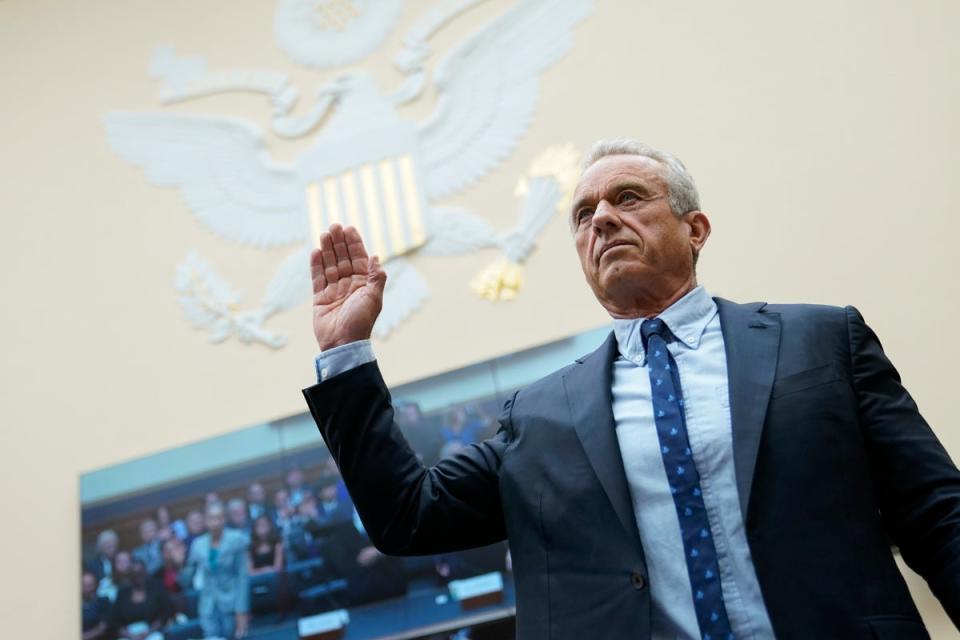
After years of outright hostility towards vaccines, Kennedy told the Republican-led committee that he was personally offended that anyone would call him “anti-vax”.
He was stunned at being described as “antisemitic”, after saying that the unvaccinated were treated worse than Anne Frank during the Holocaust, or that “Ashkenazi Jews” are the “most immune” to Covid-19.
“These are the most appalling, disgusting pejoratives, and they’re applied to me to silence me,” he said.
His insurgency campaign has won many admirers. Celebrities from Kelly Slater to Eric Clapton, Woody Harrelson to Jack Dorsey have endorsed or supported him.
Kennedy recently travelled to country music sensation Oliver Anthony’s family farm in Virginia to talk about how to “reclaim our lost young people”. Silicon Valley’s contrarian tech moguls have hosted big-dollar fundraisers, despite his claims that wi-fi causes cancer and “leaky brain”.
In fact, many of his large donors are Republicans. He has found a receptive audience among hardcore conspiracy mongers such as Alex Jones and Steve Bannon.
But his long-shot primary campaign to unseat the sitting president appears to have hit a wall in recent weeks.
Kennedy’s support among Democrats, which had reached as high as 15 per cent, has waned. A recent Morning Consult Pro poll put him at 9 per cent, a record low for his campaign.
As momentum in the Democratic primary dropped, he was linked to a possible move to the Libertarian Party, before later confirming he would run as an independent.
Analysis is divided on whose campaign Kennedy could hurt the most in a general election.
‘They’re afraid of him’
On 28 September, Kennedy strode on stage at the opening of his New Jersey campaign headquarters to chants of “Bobby, Bobby”.
The 69-year-old’s piercing blue eyes sparkled as he raised his arms to the 150 or so supporters who braved a damp evening for a glimpse of the fourth member of the illustrious political dynasty to run for president.
Kennedy launched into a diatribe about homelessness in San Francisco, telling the audience how shocked he had been to see that the flagship stores of leading fashion houses such as Gucci, Prada, Burberry and Hermes, as well as Bloomingdale’s, had closed around Union Square and been replaced with “acre after acre of plywood”.
“It troubled me because this is probably the most beautiful city in the United States. And it’s ruined. Imagine [New York City’s] Fifth Avenue with no stores, just plywood. That’s what San Francisco looks like today.”
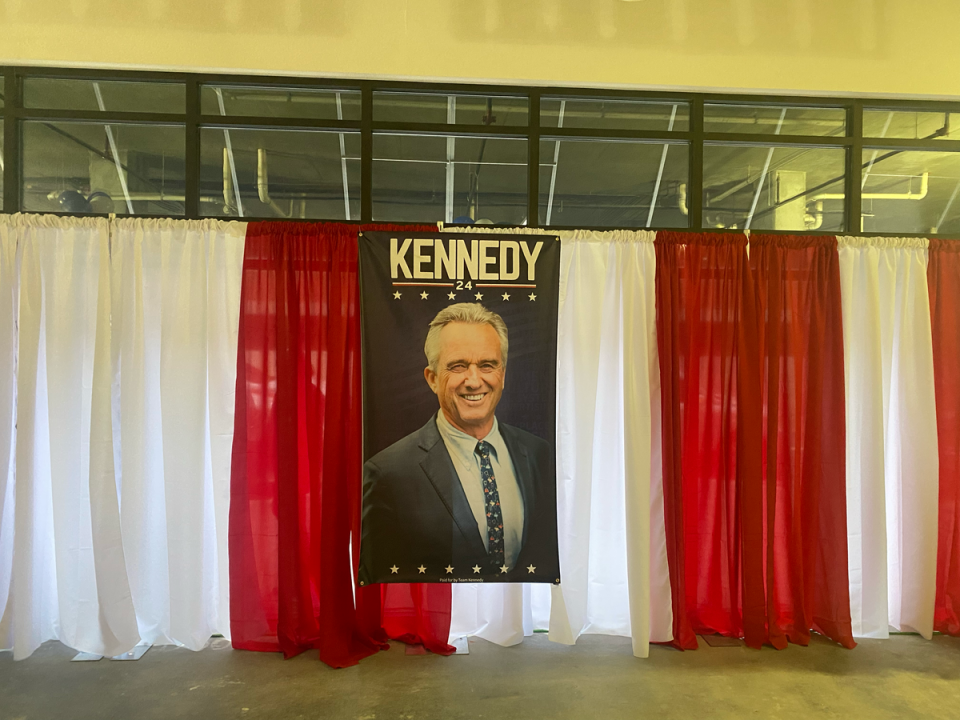
The audience in Elizabeth, New Jersey, did not appear to be concerned about the hypothetical struggles of New York shoppers.
During his speech, Kennedy frequently emphasised the importance of home ownership to restoring “American greatness”.
He blamed the “corrupt merger of state and corporate power” for declining property ownership rates among the middle class, saying: “They’re strip-mining the wealth of the American people, and they’re doing it right in front of us.”
One man in his thirties, Matt, who declined to give his last name, told The Independent he was attending his second Kennedy campaign event in the space of a month.
“I believe his uncle was killed by the establishment, and his father. So I think they’re probably afraid of him,” he said.
Should Kennedy fail to win the Democratic nomination, Matt said he would vote for Donald Trump in the general election.
“There’s a lot of people like that. People are looking for an anti-establishment candidate,” he said.
‘Just asking questions’
Transcripts from dozens of YouTube and podcast interviews, collected by the Brookings Institution think tank and shared with The Independent, reveal how Kennedy often uses misleading rhetorical flourishes in speeches and interviews.
Kennedy throws out facts and acronyms at blistering speed. He misleadingly cites studies and historical events while claiming to have simple solutions to complex societal problems.
Joseph Gantt, a professor of Rhetoric & Media Studies and political misinformation expert at Lewis and Clark College, told The Independent that Kennedy’s rhetoric appeared to have shifted during the campaign from “just asking questions” to someone who tries to establish himself as an authority figure on an array of topics.
Kennedy uses a “seemingly authentic, natural understanding of the issues”, to promote a distinctive worldview where conspiracy theories often overlap with one another, he said.
“It’s a moving target, depending on which particular target is being made on which particular day,” Professor Gantt told The Independent in a phone interview.
“It’s more than just accepting facts, it’s about accepting a different worldview. Rejecting expert opinion, rejecting the elites. You have to be able to make multiple events fit in this worldview.”
Professor Gantt said Kennedy employs a common rhetorical technique of “they” and “us”.
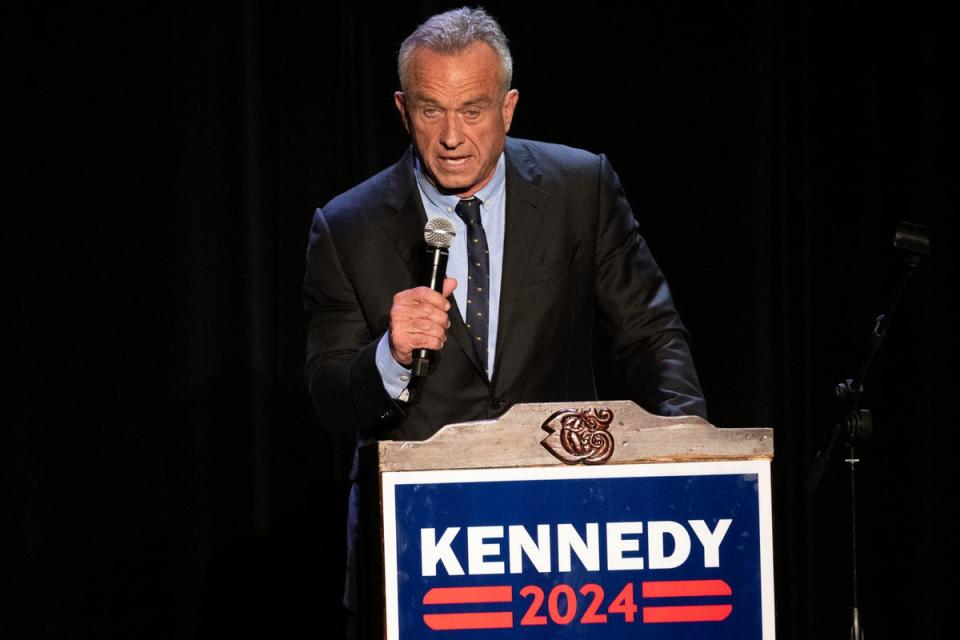
“When Kennedy uses the word ‘they’, it does two things: it makes those experts and elites seem like something other or an enemy,” he said. “And if you’re not one of them, you must be one of us. This makes it more likely that the audience will accept the next conspiracy theory.”
He suggested that Kennedy’s style of communication could be traced back to earlier iterations of populist extremism, such as the rabidly anti-communist John Birch Society of the 1950s.
“These types of conspiracy theories have been around for a long time, and the rhetoric techniques have been around for a long time, but it’s a lot easier to get your message across today,” Prof Gantt said.
“There will always be an avenue for a candidate who says ‘I’m an outsider and I question authority’.”